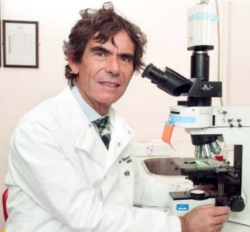Today [Wednesday 5 July] we celebrate 75 years of the NHS – the first universal health care system to be established anywhere in the world.
Since it was established in 1948, the National Health Service (NHS) has become one of the nation’s most-loved institutions, playing a vital role in our lives.
We are proud to work closely with the NHS, from training the doctors, specialist surgeons and dentists of tomorrow, to research breakthroughs today.
We’re also shining a spotlight on how, by working closely with colleagues in Bristol’s two large NHS hospitals – North Bristol NHS Trust (NBT) and University Hospitals Bristol and Weston NHS Foundation Trust (UHBW) – our research and teaching has helped to shape the NHS and improve people’s health:
1. Bristol Medical School
Bristol had a medical school long before the current University received its Royal Charter in 1909. Founded in 1833, Bristol Medical School educated scholars from the city and beyond, including the famous cricketer W.G. Grace, who enrolled at the Medical School in 1868. In 1893, the Medical School was incorporated into what was, for a short time, University College, Bristol.
Medicine has been taught at Bristol on a continuous basis since the first Medical School. It now comprises around 1,327 students and around 900 staff, who through research and teaching improve the health of individuals and populations locally, nationally and internationally. Nearly 6,000 students have graduated in medicine over the past 30 years.
2. Cutting cot death by 80%
Thirty-one years ago, Professor Peter Fleming pioneered research which showed lives could be saved if babies were placed on their backs – and not their fronts – to sleep. It is estimated his research has saved the lives of more than 20,000 babies in the UK alone and has changed official advice about safer sleeping for babies the world over.
3. Cooling baby treatment one of ‘Nation’s Lifesavers‘
Marianne Thoresen, Professor of Neonatal Neuroscience, discovered that cooling babies who have suffered a lack of oxygen at birth improves their survival without brain damage in later childhood. Professor Thoresen was named by Universities UK as one of the ‘Nation’s Lifesavers’. This approach has already saved 1,500 babies from death and disability each year.
4. Largest ever pneumonia trial to be carried out
Over 22,000 participants will be recruited in the largest ever trial to investigate whether aspirin can reduce the risk of a heart attack or stroke in patients who are admitted to hospital with pneumonia. Led by Bristol, sponsored by NBT and supported by the Bristol Trials Centre, the ‘Aspirin after hospitalisation with Pneumonia to prevent cardiovascular Events randomised Controlled Trial’ (ASPECT) will invite adults over 50 who have been admitted to hospital with pneumonia to take part over the next four years.
5. New guidance on hip fracture services will improve recovery for thousands of patients
A new ‘toolkit’ for senior doctors and hospital managers, that will help make changes to their organisational arrangements and improve the quality of hip fracture care across the UK, has been launched by The Royal Osteoporosis Society (ROS) in collaboration with University researchers.
The guidance was developed after the REDUCE study, carried out by the University, found how well patients recover after a hip fracture varies enormously between NHS hospitals in England and Wales.
6. Bristol Network awarded Tessa Jowell Centre of Excellence status for brain tumour research
With 12,000 people diagnosed with a brain tumour every year in the UK, there has never been a more important time to recognise the efforts of NHS staff committed to developing and improving brain tumour treatment and care.
The Bristol Network, which includes NBT, UHBW, Gloucestershire Hospitals NHS Foundation Trust and Royal United Hospitals Bath NHS Foundation Trust, was recognised for its commitment to service development, in particular the further development of its rehabilitation pathways.
It is hoped that for the 88,000 British people currently living with a brain tumour, the Excellence status provides reassurance about the availability of excellent care and commitment to improvement in the NHS across the UK
7. Bristol childhood obesity clinic forms blueprint for national NHS pilot
The Care of Childhood Obesity (CoCo) at the Bristol Royal Hospital for Children is led by clinicians and researchers from the University, UHBW and the National Institute for Health Research Bristol Biomedical Research Centre (NIHR Bristol BRC). It treats children experiencing health complications related to severe obesity, and offers children specialist treatment tailored care packages developed with their family, which could include diet plans, mental health treatment and coaching. In 2021, 15 new specialist NHS services were created, based on the Bristol clinic.
8. Bristol’s research plays a key role in the world’s response to COVID-19
Collaborating with colleagues at UHBW and NBT, Bristol researchers carried out clinical trials to assess how well certain vaccines worked to prevent people from becoming infected with COVID-19.
Longitudinal studies, also carried out by University and NHS teams, explored the impact of lockdowns and the pandemic on mental health and antibody testing.
9. Pfizer’s Vaccine Centre of Excellence launches at the University of Bristol
In 2021, a new Pfizer Centre of Excellence for Epidemiology of Vaccine-preventable Diseases was launched at the University.
The centre conducts real-world population-based surveillance studies in hospitals and the community to identify and measure the burden of specific vaccine-preventable infectious diseases affecting adults, including the elderly, as well as children. Research will also be undertaken to support the design, development and use of next-generation vaccines.
10. How the University of Bristol supported NHS staff and volunteers during the pandemic
During the Covid pandemic, 100 rooms in the University’s student accommodation were given to NHS workers and volunteers. The University also made two of its biggest car parks available to NHS staff at UHBW, and donated personal protective equipment, such as suits, goggles, gloves and masks to the South Western Ambulance Service and NHS workers.
Almost 300 fifth year medical students joined the frontline prior to their graduation to help the NHS.
11. Intervention to help GPs identify, assess and treat patients with hepatitis C found to be effective
The University led the first clinical trial to increase the identification and treatment of hepatitis C virus (HCV) patients in primary care, which was found to be effective, acceptable to staff and highly-cost effective for the NHS.
Around 143,000 people in the UK have chronic HCV infection. As symptoms do not appear for several years, less than half of people infected are aware they have HCV and many more are not receiving treatment, increasing the risk of liver damage and passing the virus to others.
Looking to the future, the University of Bristol is working on dozens of research projects which could revolutionise NHS healthcare:
12. First ever clinical trial of laboratory grown red blood cells being transfused into another person underway
Red blood cells grown in a laboratory have now been transfused into another person in a world first clinical trial led by a UK team including Bristol researchers. If proved safe and effective, manufactured blood cells could in time revolutionise treatments for people with blood disorders such as sickle cell and rare blood types.
13. Mesenchymal cell plasters to stop children needing repeated heart surgeries
University researchers, funded by the British Heart Foundation (BHF), have developed ‘mesenchymal cell plasters’ to revolutionise the way surgeons treat children living with congenital heart disease, so they don’t need as many open-heart operations.
There are around 200 repeat operations for people living with congenital heart disease every year in the UK. The technology could save the NHS an estimated £30,000 for every operation no longer needed, saving millions of pounds each year.


 A University of Bristol researcher who developed a new revolutionary type of ‘heart plaster’ that could improve the way surgeons treat children living with congenital heart disease has been shortlisted for the British Heart Foundation’s (BHF) Research Story of the Year, part of the charity’s annual Heart Hero Awards.
A University of Bristol researcher who developed a new revolutionary type of ‘heart plaster’ that could improve the way surgeons treat children living with congenital heart disease has been shortlisted for the British Heart Foundation’s (BHF) Research Story of the Year, part of the charity’s annual Heart Hero Awards. The gene that can stop ageing Professor Madeddu and his team have discovered that a naturally occurring variant of the BPIFB4 gene, which is more common in people who live to 100 or more, could help keep the heart young. A gene variant is a permanent change in the DNA sequence that makes up a gene. The team have already learned that mice treated with this variant have healthier hearts. In fact, transferring this gene variant to old mice seemed to help relax blood vessels in mice with high blood pressure and increase the amount of blood delivered to the muscles. In humans, ageing can affect many parts of the body, including weakening the heart and circulatory system. For example, heart failure, a serious and sometimes disabling condition for which there is no cure other than a heart transplant. Symptoms include breathlessness and feeling abnormally tired. Heart failure can occur at any age, but it is more common in older people, and in people who have had a heart attack and who have cardiomyopathy or high blood pressure.
The gene that can stop ageing Professor Madeddu and his team have discovered that a naturally occurring variant of the BPIFB4 gene, which is more common in people who live to 100 or more, could help keep the heart young. A gene variant is a permanent change in the DNA sequence that makes up a gene. The team have already learned that mice treated with this variant have healthier hearts. In fact, transferring this gene variant to old mice seemed to help relax blood vessels in mice with high blood pressure and increase the amount of blood delivered to the muscles. In humans, ageing can affect many parts of the body, including weakening the heart and circulatory system. For example, heart failure, a serious and sometimes disabling condition for which there is no cure other than a heart transplant. Symptoms include breathlessness and feeling abnormally tired. Heart failure can occur at any age, but it is more common in older people, and in people who have had a heart attack and who have cardiomyopathy or high blood pressure.